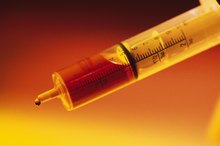Do Vitamins Cause Liver Enzymes to Be Elevated?
Vitamins are often considered to be little units of magic that can do no wrong; however like every other type of nutrient, too much or too little can be a bad thing. Vitamin deficiencies and high doses of certain vitamin supplements that raise liver enzymes are both bad.
If you are experiencing serious medical symptoms, seek emergency treatment immediately.
Tips
Vitamins A and B3 are supplements that may raise liver enzymes if taken in high doses. Vitamin deficiencies can also affect the liver.
Wait, What Are Liver Enzymes?
Your liver is the largest organ in your body and the real MVP.
The liver also acts like a filtration system, filtering out drugs, alcohol, toxins and chemicals from your blood. It then processes the waste so your body can get rid of it via bile or urine.
Read more: The 5 Best Foods for Fighting Liver Problems
The liver carries out all these functions with the help of enzymes, which are proteins that speed up the chemical reactions in your body. While there are several types of liver enzymes, the most common ones are alanine transaminase (ALT), aspartate transaminase (AST), alkaline phosphatase (ALP) and gamma-glutamyl transpeptidase (GGT).
- Your liver is the largest organ in your body and the real MVP.
- Read more: The 5 Best Foods for Fighting Liver Problems The liver carries out all these functions with the help of enzymes, which are proteins that speed up the chemical reactions in your body.
Supplements That Raise Liver Enzymes
Which Vitamins Help to Fight a Fatty Liver?
Learn More
When the liver is damaged or injured in some way, liver enzymes leak from the liver into your bloodstream. Raised levels of enzymes in your blood are detected in liver function tests and are an indication that the liver is either damaged or not functioning correctly 8. For example, high levels of the enzymes AST and ALT in your bloodstream are a sign of acute liver damage 8.
Read more: How to Cleanse the Human Liver of Toxins
Excess doses of certain vitamin supplements, like Vitamin A and B3, can damage the liver and raise liver enzymes levels. Deficiencies of certain vitamins can also affect your liver. Consult your doctor about your nutritional needs before you start supplementing your diet to prevent liver damage from supplements and make it a point to get tested regularly to ensure that you don’t have any nutritional deficiencies.
- When the liver is damaged or injured in some way, liver enzymes leak from the liver into your bloodstream.
- Raised levels of enzymes in your blood are detected in liver function tests and are an indication that the liver is either damaged or not functioning correctly 8.
Vitamin A Supplements
Vitamin A is toxic if consumed in high doses, in the vicinity of 12,000 micrograms and above. Known as hypervitaminosis A, or vitamin A poisoning, it occurs because:
- the excess vitamin A
- which is fat-soluble
- is stored in your liver
- where it accumulates
- causes liver damage
You could be at risk for hypervitaminosis A if you take vitamin A supplements or if you eat a lot of liver and organ meat 2.
Niacin to Treat Cholesterol
What Are the Benefits of Vitamin B-1 or Thiamine?
Learn More
Vitamin B3, also known as niacin or nicotinic acid, is essential to health. The recommended dietary allowance of niacin is 14 to 16 milligrams a day for most adults, 18 milligrams for pregnant women and 2 to 12 milligrams for children, according to the NIH. Most multivitamins and vitamin B supplements contain niacin in doses close to the recommended amount and do not pose a threat to your liver.
Read more: What Are the Pros and Cons of Taking 500 mg of Niacin?
However, niacin is also prescribed to control cholesterol. High doses of it can lower low density lipoprotein (LDL) cholesterol and raise high density lipoprotein (HDL) cholesterol. Anywhere between 1 to 6 grams of niacin are prescribed per day to treat high cholesterol and improve heart health 3.
This increased dose of niacin can sometimes cause hepatotoxicity, which is the term used to describe liver damage caused by chemicals. Its symptoms include jaundice, itching, nausea, vomiting and fatigue. Most cases are mild and heal quickly once you stop taking niacin. The symptoms disappear within a few days but it can take weeks or sometimes even months for your enzyme levels to return to normal.
There is also a small chance that the hepatotoxicity is so acute that it results in liver failure, which can be either fatal or require an emergency liver transplant. If you are taking niacin to treat a heart condition, make sure you discuss the risk of elevated liver enzymes with your physician 1.
- Vitamin B3, also known as niacin or nicotinic acid, is essential to health.
- This increased dose of niacin can sometimes cause hepatotoxicity, which is the term used to describe liver damage caused by chemicals.
Vitamin Deficiencies and Liver Enzymes
There is a growing body of evidence that suggests that vitamin deficiencies can have adverse effects on the liver and cause elevated liver enzymes 17. A study published in the journal Current Opinion in Clinical Nutrition and Metabolic Care in May 2013 found that a choline deficiency can result in fatty liver, liver fibrosis and hepatocarcinoma, which is a form of cancer that originates in the liver.
A small study published in Nutrients in March 2018 found that low levels of vitamin B9, also known as folate, and vitamin B12 can lead to a severe form of non-alcoholic fatty liver disease (NAFLD) called nonalcoholic steatohepatitis (NASH) 5.
Read more: Fruits and Vegetables Containing Folic Acid
A January 2016 study published in PLOS One found a moderate association between vitamin C deficiency and NAFLD in middle-aged and older adults, especially in males and non-obese people 6.
An April 2018 review published in the journal Nutrients found that while people with liver diseases tend to be deficient in vitamin D, further investigation is required to determine whether it is a cause or correlation 7.
- There is a growing body of evidence that suggests that vitamin deficiencies can have adverse effects on the liver and cause elevated liver enzymes 1_ in May 2013 found that a choline deficiency can result in fatty liver, liver fibrosis and hepatocarcinoma, which is a form of cancer that originates in the liver.
- Read more: Fruits and Vegetables Containing Folic Acid A January 2016 study published in PLOS One.
- An April 2018 review published in the journal _Nutrients.
Related Articles
References
- Cleveland Clinic: “Elevated Liver Enzymes”
- American International Medical University: “Hypervitaminosis A: Symptoms, Causes, Diagnosis and Management”
- National Institutes of Health: “Niacin”
- U.S. Library of Medicine: “Choline’s Role in Maintaining Liver Function: New Evidence for Epigenetic Mechanisms”
- Nutrients: “Folate and B12 Levels Correlate With Histological Severity in NASH Patients”
- PLOS One: “Association Between Dietary Vitamin C Intake and Non-Alcoholic Fatty Liver Disease: A Cross-Sectional Study Among Middle-Aged and Older Adults”
- U.S. Library of Medicine: “Vitamin D and the Liver—Correlation or Cause?”
- Lab Tests Online: “Liver Function Tests”
- Cleveland Clinic. Cirrhosis of the Liver. Reviewed January 11, 2019.
- David S, Hamilton JP. Drug-induced Liver Injury. US Gastroenterol Hepatol Rev. 2010;6:73–80.
- American Liver Foundation. Medications.
- Cleveland Clinic Health Essentials. Is Acetaminophen Safe to Take When You're Drinking? Published December 19, 2017.
- University of Michigan, Michigan Medicine. Methyldopa. Revised September 17, 2018.
- Elsevier Science Direct. Hypervitaminosis A. Published 2015.
- National Center for Biotechnology Information, U.S. National Library of Medicine. LiverTox: Clinical and Research Information on Drug-Induced Liver Injury: Vitamin A. Updated December 3, 2013.
- National Center for Biotechnology Information, U.S. National Library of Medicine. LiverTox: Clinical and Research Information on Drug-Induced Liver Injury: Niacin. Updated February 2, 2014.
- Amathieu R, Levesque E, Merle JC, et al. Insuffisances hépatiques aiguës sévères d'origine toxique : prise en charge étiologique et symptomatique [Severe toxic acute liver failure: etiology and treatment]. Ann Fr Anesth Reanim. 2013;32(6):416–421. doi:10.1016/j.annfar.2013.03.004
- Devarbhavi H. An Update on Drug-induced Liver Injury. J Clin Exp Hepatol. 2012;2(3):247–259. doi:10.1016/j.jceh.2012.05.002
- Johns Hopkins Medicine. Drug-Induced Hepatitis.









